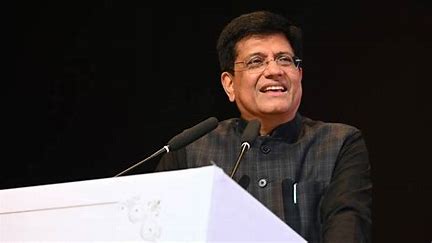Add your promotional text...
Bharat@100: Piyush Goyal Unveils Vision for Industrial Growth, Sustainability, and Unity
Synopsis: At the Bhart@100 Summit, Commerce and Industry Minister Piyush Goyal announced transformative plans, including the establishment of 20 industrial townships, fostering sustainability, and redefining education for entrepreneurship. With a focus on collective growth, the minister outlined India's roadmap to becoming a developed nation by 2047, urging collaboration across all sectors.
TOP STORIES
By Viswas Saxena
12/5/20243 min read


As India strides toward its centenary of independence in 2047, the government is laying the groundwork for economic resilience, industrial growth, and sustainable development. Commerce and Industry Minister Piyush Goyal, addressing the Bhart@100 Summit hosted by Assocham, outlined an ambitious roadmap that not only envisions India's transformation into a developed nation but also underscores the collaborative effort required from every sector of society.
20 Industrial Townships: Catalysts of Economic Growth
Minister Goyal announced the establishment of 20 new industrial townships across India, a step aimed at creating hubs for innovation, manufacturing, and economic activity. The first of these has already begun operations in Noida.
“These townships will be engines of growth, driving regional development and fostering a spirit of entrepreneurship. They will serve as testaments to India’s ability to marry tradition with modernity,” he said. With the active participation of industries, Goyal emphasized that progress could be achieved faster, aligning with India’s aspirations of global prominence.
Mindset Shift: Quality and Sustainability as India’s Identity
A central theme of Goyal's address was the need for a change in mindset. He urged Indians to adopt high quality and sustainability as defining characteristics of their global engagement.
“We must recognize these attributes as our calling card. They are not just aspirations but necessities in an increasingly competitive and environmentally conscious world,” he remarked.
Goyal also highlighted the government’s openness to alternative financing models for MSMEs, a critical move to ensure liquidity and innovation in a sector that forms the backbone of the economy. Furthermore, he proposed integrating entrepreneurship education into engineering curriculums, equipping future leaders with the tools to innovate and lead.
The Panch Pran: India’s Guiding Principles for 2047
Reflecting on Prime Minister Narendra Modi’s vision, Goyal reiterated the ‘Panch Pran’—a five-point strategy to drive India toward developed nation status by 2047.
Collective Aspiration: He emphasized the collective responsibility of 1.4 billion Indians to achieve this goal, shedding remnants of the colonial mindset and embracing pride in India’s rich history and traditions.
Unity Without Discrimination: The government, he noted, has eliminated caste, creed, and religious bias in its welfare initiatives, fostering unity across the nation.
Responsibility to the Nation: Goyal called on every citizen to actively contribute to making India a global powerhouse.
Sustainability: India’s Stand on Greenhouse Gases
In a candid critique of global sustainability discourse, Minister Goyal highlighted the disproportionate blame placed on developing nations for greenhouse gas emissions.
“Developed nations industrialized on the back of coal-based energy for over a century. Yet, they now expect developing countries to address these global challenges without adequate financial or technological support,” he stated.
India, while striving for sustainability, has a consumption pattern far lower than developed countries. Goyal emphasized the need for equity and support from wealthier nations to ensure that sustainability does not come at the cost of growth for developing economies.
The Role of the Private Sector in Bharat@100
Assocham President Sanjay Nayar complemented Goyal’s vision by highlighting the vital role of the private sector in realizing the Bharat@100 dream.
“The government has invested significantly in infrastructure—social, physical, and digital. However, achieving the vision of Bharat@100 will require the private sector to step up,” he said.
Nayar pointed out that trade diplomacy through Free Trade Agreements (FTAs), investment corridors, and collaboration with friendly nations has significantly benefited MSMEs. These efforts, he noted, will play a critical role in elevating the sector, which serves as the backbone of India's economy.
A Call to Action: Shaping India’s Future Together
Goyal’s address at the Bhart@100 Summit was more than just an outline of government initiatives; it was a call to action. From the creation of industrial townships to redefining education and championing sustainability, every stakeholder—government, private sector, and citizens—has a part to play in shaping India’s future.
This vision for 2047 is not just about economic metrics; it’s about creating a society rooted in equality, sustainability, and pride in its heritage. As Goyal aptly summarized, “India’s journey to greatness is a shared responsibility. Together, we can achieve what may seem impossible today.”
By uniting ambition, innovation, and tradition, Bharat@100 is set to redefine what it means to be a developed nation in the 21st century.
In conclusion, India’s journey to 2047 requires an unwavering commitment to unity, innovation, and sustainability. The vision laid out by Piyush Goyal at the Bhart@100 Summit serves as a roadmap, inspiring collective effort across sectors and communities. With government initiatives paving the way and private sector collaboration amplifying impact, India stands poised to rise as a global leader, driven by the aspirations of 1.4 billion people.
